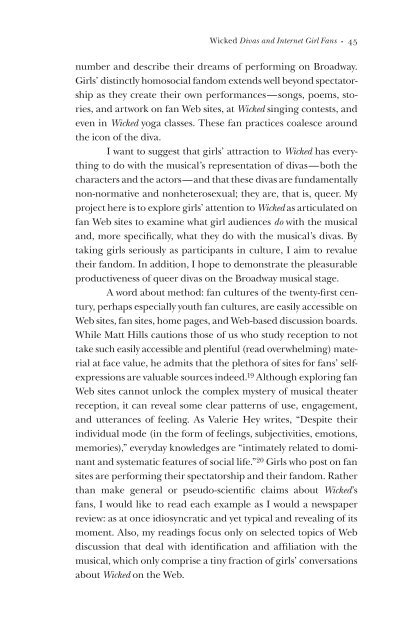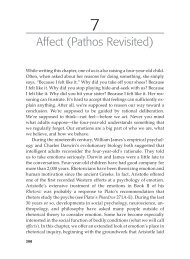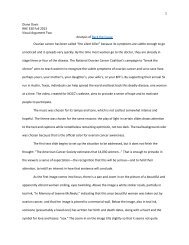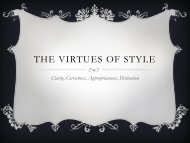(Kristin Chenoweth) and Elphaba - Camera Obscura: Feminism ...
(Kristin Chenoweth) and Elphaba - Camera Obscura: Feminism ...
(Kristin Chenoweth) and Elphaba - Camera Obscura: Feminism ...
- No tags were found...
Create successful ePaper yourself
Turn your PDF publications into a flip-book with our unique Google optimized e-Paper software.
Wicked Divas <strong>and</strong> Internet Girl Fans • 45<br />
number <strong>and</strong> describe their dreams of performing on Broadway.<br />
Girls’ distinctly homosocial f<strong>and</strong>om extends well beyond spectatorship<br />
as they create their own performances — songs, poems, stories,<br />
<strong>and</strong> artwork on fan Web sites, at Wicked singing contests, <strong>and</strong><br />
even in Wicked yoga classes. These fan practices coalesce around<br />
the icon of the diva.<br />
I want to suggest that girls’ attraction to Wicked has everything<br />
to do with the musical’s representation of divas — both the<br />
characters <strong>and</strong> the actors — <strong>and</strong> that these divas are fundamentally<br />
non-normative <strong>and</strong> nonheterosexual; they are, that is, queer. My<br />
project here is to explore girls’ attention to Wicked as articulated on<br />
fan Web sites to examine what girl audiences do with the musical<br />
<strong>and</strong>, more specifically, what they do with the musical’s divas. By<br />
taking girls seriously as participants in culture, I aim to revalue<br />
their f<strong>and</strong>om. In addition, I hope to demonstrate the pleasurable<br />
productiveness of queer divas on the Broadway musical stage.<br />
A word about method: fan cultures of the twenty-first century,<br />
perhaps especially youth fan cultures, are easily accessible on<br />
Web sites, fan sites, home pages, <strong>and</strong> Web-based discussion boards.<br />
While Matt Hills cautions those of us who study reception to not<br />
take such easily accessible <strong>and</strong> plentiful (read overwhelming) material<br />
at face value, he admits that the plethora of sites for fans’ selfexpressions<br />
are valuable sources indeed. 19 Although exploring fan<br />
Web sites cannot unlock the complex mystery of musical theater<br />
reception, it can reveal some clear patterns of use, engagement,<br />
<strong>and</strong> utterances of feeling. As Valerie Hey writes, “Despite their<br />
individual mode (in the form of feelings, subjectivities, emotions,<br />
memories),” everyday knowledges are “intimately related to dominant<br />
<strong>and</strong> systematic features of social life.” 20 Girls who post on fan<br />
sites are performing their spectatorship <strong>and</strong> their f<strong>and</strong>om. Rather<br />
than make general or pseudo-scientific claims about Wicked’s<br />
fans, I would like to read each example as I would a newspaper<br />
review: as at once idiosyncratic <strong>and</strong> yet typical <strong>and</strong> revealing of its<br />
moment. Also, my readings focus only on selected topics of Web<br />
discussion that deal with identification <strong>and</strong> affiliation with the<br />
musical, which only comprise a tiny fraction of girls’ conversations<br />
about Wicked on the Web.










